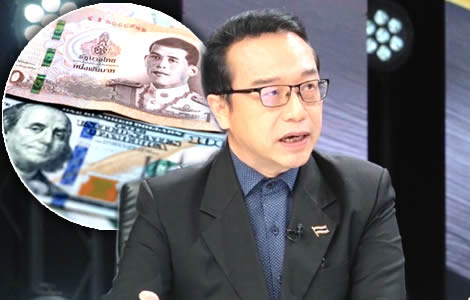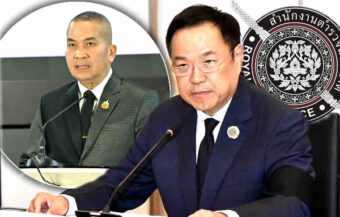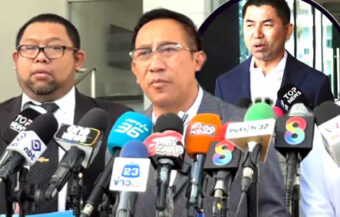Top Thai economist Dr. Anusorn warns the US dollar is set to weaken under Trump’s new trade war, pushing the baht up. He urges swift action from Bangkok, including FTAs and ASEAN unity, to seize export gains and avoid getting steamrolled by US demands.
A leading Thai economist is urging the government to respond more decisively and swiftly to the escalating global trade war. Dr. Anusorn Thamjai explains that the current challenge posed by the United States may soon require firm political decisions from Thailand. At its core, Washington is likely to demand greater access for its services industry within the Thai market. At present, these sectors remain heavily protected, largely for the benefit of major Thai firms and conglomerates. More broadly—and with greater long-term significance—Dr. Anusorn predicts that this trade shift will lead to a weaker US dollar and, in turn, a stronger Thai baht. This currency shift, he warns, is yet another challenge for an already fragile economy.

Associate Professor Dr. Anusorn Thamjai believes the long-term effect of President Donald Trump’s tariff regime will be a weaker US dollar. As the United States imposes steep new trade barriers—most notably a 50% tariff on imports from the European Union—the underlying aim, he argues, is not just to punish trade rivals. Instead, the Trump administration appears to be setting the stage for a fundamental shift in global monetary dynamics.
Dr. Anusorn, Dean of the Faculty of Economics and Director of the Centre for Research on Digital Economy, Investment and International Trade at the University of the Thai Chamber of Commerce, said the US may deliberately weaken the dollar to restore its trade balance.
A weaker dollar may shrink the US trade deficit while triggering investor fears and global currency disruption
A cheaper dollar would make American goods more competitive globally. Over time, that could help reduce the country’s chronic trade deficit, which now exceeds $1 trillion annually with key partners like the EU and China.
He cited historical precedent, pointing to the 1985 Plaza Accord. Back then, the US persuaded allies—Japan, Germany, the UK, and France—to appreciate their currencies. That move helped the US economy regain competitiveness by lowering the dollar’s value.
However, he stressed that repeating such a multilateral currency intervention today would be far more difficult, given rising geopolitical tensions and weakened trust in US financial leadership.
Nonetheless, Dr. Anusorn warned that even without formal agreements, the US has tools to pursue dollar devaluation unilaterally. Chief among these is the new wave of protectionist tariffs—such as the 50% EU import duty set to take effect June 1. These measures are expected to disrupt global trade flows and shake investor confidence in the dollar.
Washington may force a currency shift with radical plans like the so-called Mar-a-Lago Accord scheme
He believes this approach may soon extend beyond tariffs. According to Dr. Anusorn, the Trump administration is also exploring more drastic financial reforms, including a proposal known as the Mar-a-Lago Accord.
This plan would encourage foreign central banks to shift from holding US dollars to long-dated, zero-coupon Treasury bonds. The goal is to reduce the global demand for dollars in the short term while shifting interest rate risk to foreign holders.
The US would effectively be asking the world to fund its public debt while giving up any interest income. In return, Washington would offer trade incentives, market access, and even security guarantees. But implementation won’t be easy. The plan represents a major gamble on America’s ability to rewrite the rules of global finance. And unlike the Plaza Accord, which had broad multilateral support, this scheme is being floated unilaterally.
Still, Dr. Anusorn said the effort shows that Washington is no longer confident in the dollar’s long-term dominance. While the greenback still accounts for roughly 58–60% of global foreign exchange reserves, that figure is slipping. More countries are selling off dollars and US government bonds.
The US also faces ballooning public debt, an unstable fiscal outlook, and a recent credit rating downgrade by Moody’s. All these factors combine to undermine long-term confidence in the dollar.
A falling dollar could push the baht up to 31 as Thailand sees capital inflows and rising surpluses
He noted that if the Trump administration pushes forward with this strategy, the baht could appreciate sharply. The Thai currency might rise to ฿31–32 per US dollar in the near future. Such a move would be driven not only by a weaker dollar but also by stronger capital inflows to Thailand.
Foreign investors are already net buyers of Thai stocks and bonds. Meanwhile, Thailand’s export sector is still growing, and the country continues to post-trade and current account surpluses. All of these trends support baht appreciation.
However, a stronger baht also brings risks. It could hurt Thai exporters, especially small and medium-sized enterprises with low-profit margins. Still, Dr. Anusorn said Thailand must be ready to adapt. He believes the country has opportunities amid the global trade turbulence—if it moves fast.
The new US-EU tariff war will likely cause significant damage to both economies. Their combined annual trade volume is nearly $1 trillion. If tariffs remain in place, prices of EU goods in the US will soar. Dr. Anusorn said this could create space for Thai exporters to step in.
Thai firms may benefit if they replace EU imports and attract relocation amid trade disruption and FTA push
He pointed to processed foods, garments, and furniture as sectors where Thai products could replace now-costly European imports in the US market. At the same time, the EU may retaliate by reducing its purchases of US goods. That too opens the door for Thailand, which could expand its footprint in European markets—particularly in agriculture, electronics, automotive parts, and electrical appliances.
Moreover, companies from Europe and other countries may consider relocating production to Thailand. Doing so would allow them to sidestep the tariffs and maintain market access. That’s why Dr. Anusorn urged Thai authorities to accelerate free trade agreement (FTA) talks with the EU. A comprehensive trade deal could lock in these advantages and make Thailand a new hub for global manufacturing.
But he warned that Thailand cannot go it alone. To negotiate effectively with large powers like the US, Thailand must work with its ASEAN partners. A united ASEAN front would have far greater leverage in talks than any single member state.
If each country negotiates bilaterally with Washington, Dr. Anusorn argued, they risk being steamrolled by US demands. These often include opening domestic markets to US goods, lowering tariffs, and accepting more foreign competition in sensitive sectors.
Politics could block reforms as Thai conglomerates and farmers resist liberalisation of key protected markets
He stressed that trade deals are not just about economics—they are deeply political. For example, American service firms want market access in sectors like telecoms and finance. But in Thailand, these areas are dominated by local conglomerates who want to protect their turf. Dr. Anusorn said these firms will resist any reforms that threaten their monopoly power.
Similarly, there are political hurdles to reforming tariffs that protect Thai farmers. Any move to lower these duties will provoke fierce opposition from rural constituencies.
Commerce Minister meets US trade boss Jamieson Greer in Korea. Paul Chambers case still dogs talks
PM Paetongtarn confirms her father Thaksin will be in court on June 13th. Trade proposals sent to the US
Top economist warns Thailand must get talks going with the United States after US-China 90-day pause is unveiled
Nevertheless, the professor argued, Thailand must not remain passive. The global trade system is shifting, and hesitation will only leave the country more vulnerable. By acting quickly—through smart FTAs, regional cooperation, and strategic export planning—Thailand can turn this crisis into an opportunity.
Finally, he reiterated that despite short-term gains, Thailand’s economy faces structural risks.
Growth is expected to slow. Yet in the immediate term, strong exports, capital inflows, and current account surpluses will support the baht. Combined with a weakening dollar, these forces will reshape Thailand’s external sector. The only question is whether the country is ready to seize the moment.
Join the Thai News forum, follow Thai Examiner on Facebook here
Receive all our stories as they come out on Telegram here
Follow Thai Examiner here
Further reading:
Commerce Minister meets US trade boss Jamieson Greer in Korea. Paul Chambers case still dogs talks


















